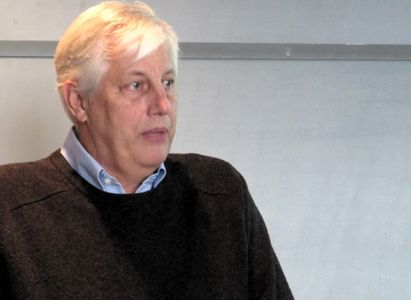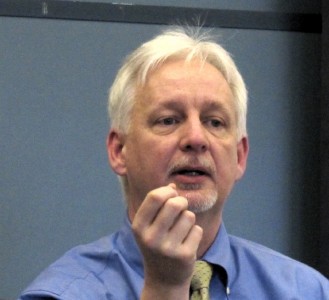Experts Discuss ‘The Business of Energy’ at 4th Sawyer Seminar
On Friday, December 3, 2010, The Frederick S. Pardee Center for the Study of the Longer-Range Future and the BU Department of Geography and Environment convened for the last Sawyer Seminar on Energy Transitions of the fall semester. The session, entitled The Business of Energy, featured Joseph Pratt, Martha Amram, and Paul McManus.

Joseph Pratt, Professor of History and Business at University of Houston, began the conversation by identifying the primacy of price as a key challenge to those who favor moving as rapidly as possible away from fossil fuels. He noted that for at least 150 years, the U.S. energy mix has been largely determined by the activities of privately-owned businesses and that, in the absence of long-term government policies, the outcome will continue to be largely determined by price. He added that it is key in debates on energy transitions not to underestimate the resilience of oil and natural gas and to be critical of the social and environmental costs of large-scale industrial renewables.
Martha Amram is senior fellow at the Milken Institute and founder and CEO of Ennovationz, which provides homeowners with advice and services for saving energy and water. Her presentation highlighted the interrelation of green capitalism, the redefinition of consumer products, and the securitization of capital markets. Her perspective on energy transitions has a clear central actor: the individual who makes a huge number of consumption decisions every day. She outlined a strategy for reversing the course of climate change using the strength of the market economy –and individual energy consumption decisions– to produce results quickly and cheaply. She concluded that with a little prodding and the help of both national and local policies, the invisible hand can go green.

Paul McManus is Lecturer at the School of Management at Boston University with over thirty years of high technology and venture capital industry experience. He highlighted strategy, sustainability, innovation and global entrepreneurship in the unfolding of future energy transitions. The major challenges to diffusion and adaptation, he added, require that we get the pricing and packaging right and deal with the human side of adoption. He concluded that this opportunity of a new “Golden Age” creates smooth transitions to new paradigms, economic growth, and prosperity.
Following the presentations the audience engaged in a lively discussion with the panelists. Prof. Najam, director of the Pardee Center, began the Q&A session by inquiring about the role of the state in the business of energy. He added that while most investments in the U.S. are geared towards retrofitting, the large investments in renewable energies in technologies in China for example, might change the structure of the markets. Some of the other issues discussed included the investment in the smart grid, the historical investments of oil companies in renewable energies, and the appropriateness of the free market as a regulator of the price of energy and of its socio-environmental externalities.

The interdisciplinary seminar series will continue during the Spring 2011 semester with the first meeting scheduled for January, 28, 2011. Supported by a grant from the Andrew W. Mellon Foundation, the series will address different facets of how energy transitions are themselves socially constituted and how they have, and are likely to, impact society.